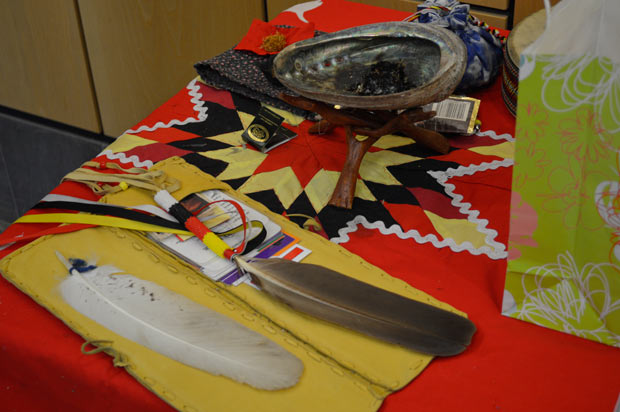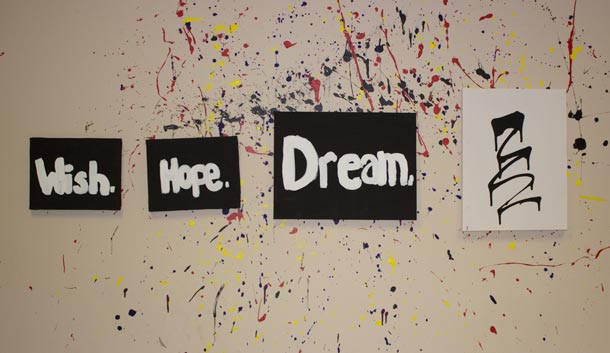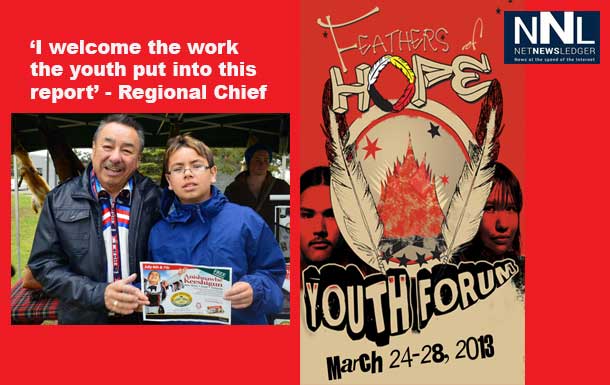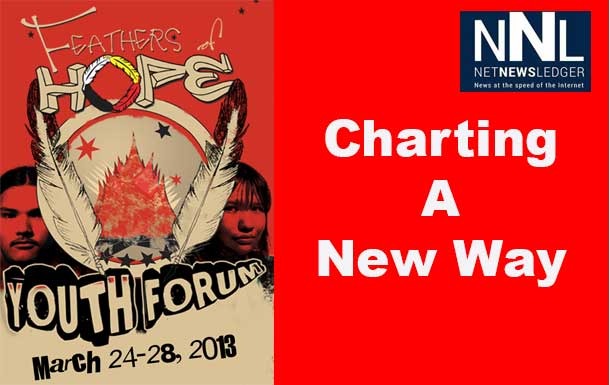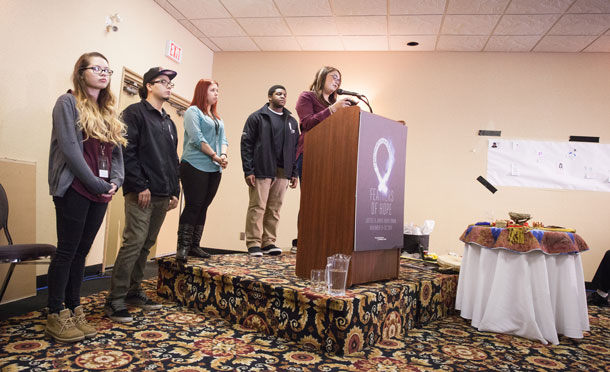

First Nations Youth Seeking Solutions in Thunder Bay
THUNDER BAY – In late November, around 150 First Nations youth from across Ontario attended the Feathers of Hope (FOH) Justice and Juries Forum held in Thunder Bay to discuss ways to address the root causes behind the underrepresentation of First Nations people on juries, and to come up with solutions to improve the relationship between them and the justice system in their communities.
Ryan Hunter, a FOH Youth Amplifier, said that the forum was meant to give young people a voice, and to reach out to supporters and “ask them to take us seriously in terms that we want to make real change in improving First Nation representation in the judicial system.”
FOH Youth Amplifier Uko Abara said that the forum was a good starting point in pointing out some of the issues inside and outside of the relationship between the justice system and First Nations communities. “According to stats, there’s up to 18 stalled inquests into the death of children because of the lack of representation of First Nations on juries,” Abara said. “So if you think about that, and the other cases that have been thrown out or stalled, it’s basically living in a place with a lack of justice and a lack of closure.”
The forum, hosted by the Office of the Provincial Advocate for Children and Youth, came from a recommendation from a report released in 2013 by the Honourable Frank Iacobucci. In an independent review on First Nations representation on Ontario juries, he identified a number of systemic, discriminating barriers that prohibited First Nations individuals from participating on jury pools, including an overall negative perception of the justice system by First Nations people. The report also detailed an intimidating and discriminating jury recruitment process.
Justice Issues Impact First Nations
Abara said that the Iacobucci report recommended that the Office of the Provincial Advocate put on a youth forum in the province to discuss the relationship between the First nations youth and community and the justice system, and also to discuss First Nation representation on juries.
“The forum was to not only talk about their experiences like we did the first time (in a previous FOH youth forum), but to come up with solutions on how, if there were issues, to better the relationships and how to solve the issues that exist today,” Abara said.
Hunter said that the discussions about the issues were typically lead by the youth, and that a lot of it was based on the fact that there is a lot of misrepresentation and underrepresentation of First Nations people in the justice and juries system.
Abara added that a lot of the issues the youth brought up came from frontline justice workers.
“A lot of the issues stemmed from the frontline justice workers. When we talk about that, we refer to basically the police in the communities. A lot of them (the youth) talked about mistreatment or mistrust of the police in the communities,” Abara said. He added that the issue of legal people who come into the communities but do not build relationships with the people they work with was also brought up.
“They come in to do what they need to do and leave, they come in and impose their own practices and leave,” Abara said. “ There’s just the idea that there isn’t a strong relationship, or a strong effort into making a good relationship between the justice and legal people and the community.”
He added that the youth also learned about the justice system and the different parts to it.
“There was a sense of them wanting to know more about the system and discussing how to better it,” Abara said. He explained that the youth were interested in getting educated on and broadening their knowledge base on what happens in the justice system. “We also talked about jury representation because that’s a really important part in trials and determining the verdicts and sentences.”
Hunter explained that the youth were put into “home groups” at the start of the forum and they came up with ideas and solutions for certain issues regarding justice and juries.
“They came up with ideas and solutions to police justice like cultural sensitivity training for police officers in northern Ontario who are working with the youth,” Hunter said. “I think overall they were very aware of the fact that the justice system is failing First Nations people.”
The youth participants came from both southern Ontario and urban areas, and northern Ontario and remote communities. Even though the youth came from different areas, Abara said that it was apparent they had similar experiences in the justice system.
“On some levels things are generally the same between north and south youth. A lot of the youth have either been through some kind of abuse from police or they witnessed it in the community,” Abara said. “Some of the youth didn’t feel comfortable approaching anything or anyone to do with the justice system, a lot of youth felt they didn’t have enough education on the justice system.”
He explained that the participants, especially from the south, didn’t realize the extent of their shared experiences as First Nations youth. “Some youth didn’t understand how far injustices went in the north,” he added, stating that it was the shared experiences that brought them together.
Hunter said that working with the youth was uplifting.
“A lot of them (the youth) were really shy at first. A lot of them came up with their earphones in and biting their nails and were nervous, but as the days progressed they came out of their shells and it was really awesome, actually,” he said. “It was uplifting because a lot of them to to experience thing that they aren’t able to experience normally. They got to recommend things that are going to improve their community as a whole.”
At the end of the forum, the youth presented their proposed solutions to government officials, First Nations leaders, police, legal, and other representatives at a “listening table. “
Abara said that it was important to have this forum with the youth because whether anyone likes it or not, the justice system is a big part of everyone’s life.
“If you as a youth or a community cannot trust it or don’t feel like there is any trust or a good relationship there, then there’s a big chance of things not working as they should,” Abara said. “So coming together and discussing how to make things better between the two parties, I think that’s a good way to start smoothing out some of the issues that exist today.”
A final report summarizing the experiences and solutions proposed by youth will be presented to the Ontario Juries Review Implementation Committee and First Nations communities in early 2015. In the meantime, the group will also be reaching out to other communities and people who weren’t able to participate in the November forum.
Abara said that the youth did a really good job in coming together and learning about the justice and juries system, and also sharing their experiences.
“At the end of the day, these youth are the ones who need to be having these kinds of discussions. Whether you look at them as leaders of today or tomorrow, the unfortunate thing is a lot of the youth are involved in the justice system today. They are the people who need to be having these conversations. They are important conversations to have.”
The Office of the Provincial Advocate reports directly to the Legislature and provides an independent voice for children and youth, including children with special needs and First Nations children. The advocates receive and respond to concerns from children, youth and families who are seeking or receiving services under the Child and Family Services Act and the Education Act (Provincial and Demonstration Schools). The Provincial Advocate may identify systemic problems involving children, conduct reviews and provide education and advice on the issue of advocacy and the rights of children.
The Office is guided by the principles of the UN Convention on the Rights of the Child and has a strong commitment to youth involvement.
Stephanie Wesley

